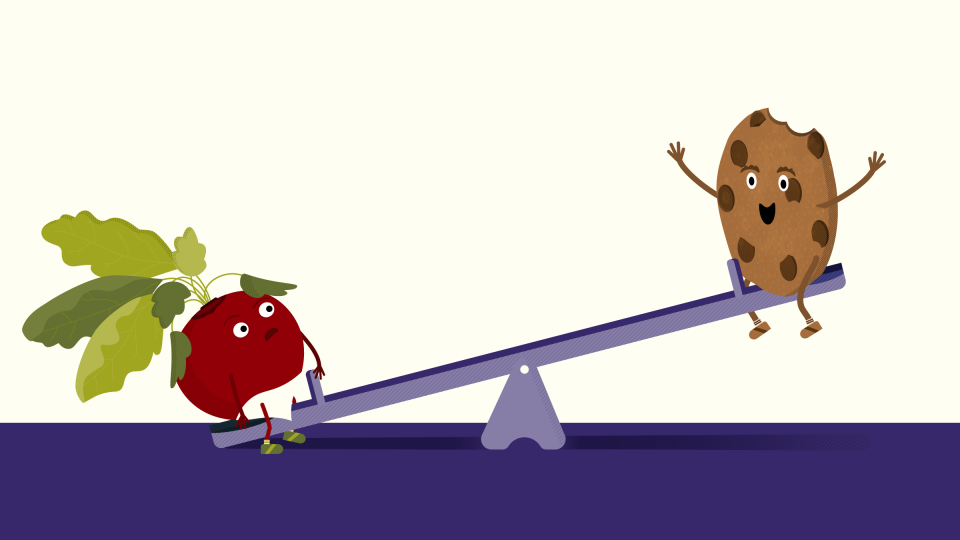
Let’s say someone offers you a cute cashmere sweater. You’d be pretty stoked, right?
Then this sweater giver shows you another cute sweater and says that you can have both of them. OK, make that double stoked.
But wait, there’s a catch.
That person needs to leave and take care of something first. If you can wait until the giver gets back, then you can have both sweaters. But if you wait and wait and just don’t want to wait anymore, you can summon the person back sooner — and only keep one sweater.
Would you be happy with just one cute cashmere sweater? Or would you hunker down for who knows how long and hold out for two?
The marshmallow test
If this hypothetical situation sounds familiar, that’s because it’s a well-known scenario set up by late psychologist Walter Mischel and his team in the 1960s and 1970s. This work laid the foundation for modern research about self-control and willpower.
In Mischel’s experiment, later known by its popularized moniker the marshmallow test, researchers tested delay of gratification in a group of preschoolers. They used small prizes like marshmallows (hence the nickname) and even poker chips as the reward.
Sometimes researchers covered the reward so it was out of sight. Other times they encouraged the kids to think of a fun memory or imagine the marshmallows were something else. Each time, they noted which techniques helped kids wait longer and which ones didn’t.
The larger implications of the marshmallow test came more than a decade later, when Mischel and his team connected with the original test subjects again in high school. Though there was a lot of variation in the follow-up findings, on average, children who were able to wait longer in the original test also rated better than their impatient peers on important life skills like concentration and stress management. Even their SAT scores were generally superior.
Now back to our own hypothetical marshmallow test — the cute cashmere sweater test, if you will. Are you the proud new owner of two imaginary sweaters, or did you cave and settle for just one?
If you caved, don’t worry. Your future isn’t doomed, despite what you might think based on Mischel’s follow-up study of the high schoolers.
Several of the preschoolers who waited the entire time during the marshmallow test actually rated poorly in high school, and some subjects who couldn’t wait as children ended up being high performers as teenagers.
“People’s ability to self-control depends a whole lot on external circumstances and, more importantly, the mental strategies people use,” says Yuichi Shoda, Ph.D., a professor in the University of Washington Department of Psychology who worked with Mischel and has co-authored several studies on the subject.
In essence, self-control is a behavior that you can learn and practice.
“People are sometimes able to control their behavior and sometimes they can’t,” Shoda explains. “The important question is: what’s different about the times when you were able to?”
The chocolate and radish test
If this all flies in the face of how you view willpower and self-control, well, that might actually be part of the problem.
The idea of willpower itself has fluctuated a lot over the years, and your beliefs about it can actually affect how much self-control you demonstrate.
“Culture has developed this notion that self-control is a matter of ‘willpower,’ but research seems to show that there’s more to it than that,” Shoda says.
One popular concept of willpower is that it’s a resource that can be depleted, like a muscle that can get overpowered or fatigued. This idea was introduced back in 1998 by psychologist Roy Baumeister.
He conducted what is now known as the chocolate and radish test. In the experiment, participants were tempted with the smell and sight of chocolate chip cookies, but only half were allowed to indulge. The others were instead given what amounts to the worst kind of consolation prize: radishes.
Then all the participants were asked to complete a puzzle. Those who were able to eat cookies and supposedly had to use less willpower resisting the treat worked harder and longer to complete the task. Those who were given radishes devoted half the time to the puzzle as their chocolate-happy peers.
Baumeister theorized that once you run out of willpower energy, you just have no more power to resist.
Rethinking willpower and self-control
But follow-up studies failed to replicate the same results, and later research presented a different view. One study theorized that it wasn’t actually the amount of willpower you had but rather whether you viewed willpower as something you could actually run out of in the first place.
So if you think you have no more willpower left after you do something that requires self-control, you’re more inclined to just give in and eat that extra slice of pizza because, hey, you have no more strength left.
But if you know that your willpower isn’t something that can be depleted, you’re more likely to tough out a long wait, try harder at a task or remind yourself why you’re turning down another piece of pie.
“It’s kind of an interesting chicken-and-egg thing,” Shoda says. “If people believe that willpower is limited then, in fact, they act as if it is limited and become even more convinced that willpower is limited. If people believe that it’s something that you can grow or is not a limited quantity, then actually their behavior follows that mental model, further strengthening their belief that it’s not limited.”
This concept of willpower doesn’t necessarily apply to those living with addiction or mental illness, however. Either way, more research needs to be done on the matter to really understand willpower and its role in our everyday lives.
Putting the control back in self-control
No matter how you view willpower, there are certain mental strategies you can use to help yourself exhibit more self-control when you most need it — as long as you’re mindful of needing the help in the first place.
“It’s a little bit like you may gain something by giving up something,” Shoda explains. “If people realize that in the face of tempting situations they can’t simply rely on ‘willpower’ and need to do something, that humble realization of one’s limitations helps your ability to learn how to resist temptation.”
So what can you do to help yourself practice more self-control when you need it?
1. Physically remove the temptation.
You know the phrase, “out of sight, out of mind?” Well, there’s some truth to that.
Sometimes Mischel’s marshmallow test researchers physically covered the treats during the children’s wait. Predictably, those who waited under these conditions were able to hold out longer than their peers who had the reward in plain sight.
For everyday situations, this can mean keeping your phone tucked away when you’re trying to get work done. Or it might be giving slices of cake to your guests to take home after a dinner party so you’re not tempted to overindulge once they leave.
2. Redirect your attention.
Some of the marshmallow test preschoolers were encouraged to think of a recent happy memory during their wait. Those who did generally waited longer than children who weren’t given these instructions.
Shoda says this is a good use of executive function, or the ability to allocate your brain resources to a different task instead of focusing on the end reward.
“If you’re faced with tasty looking marshmallows, and if you happen to know it’s not a good idea to think about the taste, what you have to do is redirect your attention from the taste,” he says.
For example, say you’re trying to cut down on extra spending to save for a dream vacation but are staring down a cute cashmere sweater that you desperately want. (Hate to break it to you, but magical sweater givers aren’t real.) Thinking about how awesome it was to hang out with your friends last weekend might actually prevent you from whipping out your credit card.
3. Visualize the temptation as something else.
Imagining the reward is something different can also help you behave with more self-control.
The preschoolers in Mischel’s experiment were encouraged to think of the marshmallows as clouds or cotton balls, and those who did were more likely to wait for longer periods of time.
So if you’re trying to stick to a diet, you might imagine a plate of cookies is actually a plate full of rocks. Doing so can help you behave with more self-control.
Testing out strategies that work best for you
Keep in mind that not every self-control technique will work for every person or in every situation.
Maybe in food-related situations, you’ll discover that imagining chocolate cake is a block of mud is the most helpful thing for you. But when it comes to being more productive at work or saving money for a house, you might notice that physically removing temptations — see ya, phone! you’re blocked, shopping sites! — helps out more.
The most important thing is acknowledging your limitations and then learning and testing which strategies might work for you.
And, hey, you don’t even have to eat radishes.

 Healthy ideas for your inbox
Healthy ideas for your inbox





